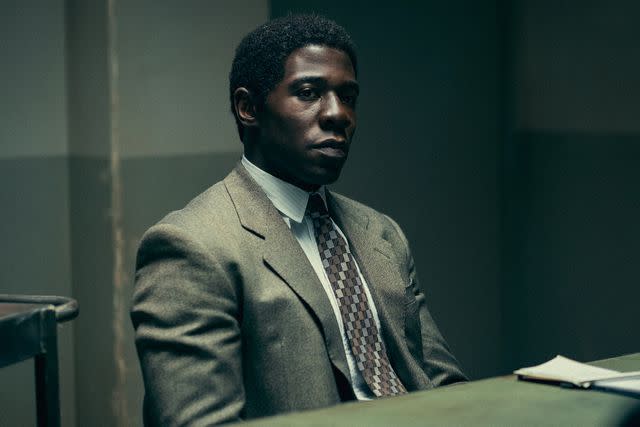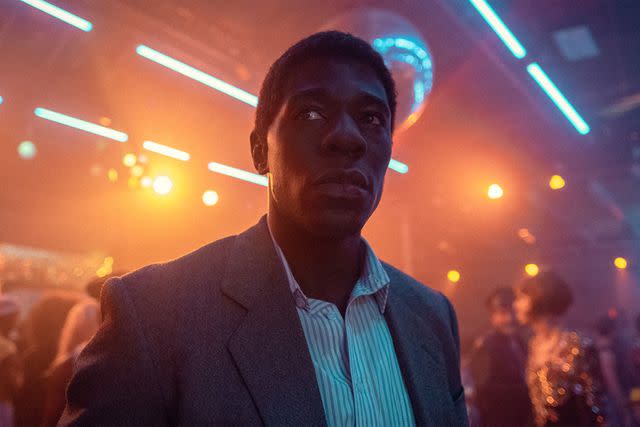“Eric” breakout McKinley Belcher III on bringing Michael Ledroit to life

"It'd be very easy for them to sideline him."
Warning: This article contains spoilers for the limited series Eric.
When Eric begins, the Netflix series follows Vincent (Benedict Cumberbatch) and Cassie (Gaby Hoffman) as two parents grappling with the sudden disappearance of their son, Egar (Ivan Howe). And when Vincent, a professional puppeteer responsible for launching a kids show called Good Day Sunshine, starts drinking excessively, he hallucinates a life-size version of Eric, a puppet his son had drawn. But the show doesn't simply follow the family.
Very quickly, viewers are also introduced to Detective Michael Ledroit (McKinley Belcher III), a Black gay man being pulled in many directions as he attempts to solve the mystery of Edgar's disappearance (as well as the less-recent disappearance of a Black teenager). As the series continues, it delves more into Ledroit's life as he does everything possible to help both kids.
Entertainment Weekly spoke with breakout McKinley Belcher III about the experience of telling Ledroit's story.

Ludovic Robert/Netflix
McKinley Belcher III in 'Eric'Related: Eric replicated Benedict Cumberbatch's eyes for the puppet
ENTERTAINMENT WEEKLY: How did this all start for you? Was it a pretty classic audition story?
MCKINLEY BELCHER III: It very much was a classic audition story. I was doing Death of a Salesman on Broadway, and I think I checked my email during intermission one day and my agents were like, "You need to do this tape ASAP. We need it by tomorrow morning." So I started learning the lines during intermission in my dressing room. I did the tape next morning. And one of the things that struck me initially was, "This is really weird." But then the more I read it, it was beautiful and it was clear that it was something that was truly original. It also became really clear to me that the show and the creative team was interested in the whole heart of the man that I would be playing.
I remember the first time the series followed Ledroit home, I was so pleasantly surprised that we were going to see more of that character.
That's one of the things that excited me about it, is it'd be very easy for them to sideline him as just the core of the investigation and it'd be a sort of procedural in terms of his journey in the show. But I'm really proud that his journey over the course of the six episodes is very much about him marching toward a place of acceptance and embracing all of himself. And only after he does that is he able to be the change that he wants to see in the world. So it's a call to action for him.
Related: Eric review: Benedict Cumberbatch's missing-kid thriller can't find the point
Aside from the kids, it really feels like Ledroit is one of the more pure-of-heart characters on the show. What drives him in your mind?
I feel like this is one of the things where it being set in the '80s and New York is really important. For a Black queer man who works in the NYPD in the '80s, he would be holding so many things inside that he wouldn't have a proper outlet. And I think there's so much about his journey and what his experience of the world is that is about mask wearing and masking what he's feeling and pushing things down. Especially with his partner dying from AIDS, that apartment would've been a really safe space for him to be free and say all the things, but this disease disrupts their peace in a way and suddenly that is not a space that he can do everything anymore. So there's nowhere that he can do everything.
Both mourning his partner and dealing with all of that stuff that's inside him acts as a kind of fuel and propels him toward doing all the stuff that he does. And because of his job, he's sitting in a place of acute observation for a great deal of the series, but especially those first three episodes where he's watching and trying to put the puzzle pieces together.

Ludovic Robert/Netflix
McKinley Belcher III in 'Eric'Sign up for Entertainment Weekly's free daily newsletter to get breaking TV news, exclusive first looks, recaps, reviews, interviews with your favorite stars, and more.
It really does feel like he's an island.
And that makes him the perfect person to be investigating and advocating for these children, because I think a lot of these children, in terms of their experience of the world, they feel like islands. And so it leaves space for him to understand them and understand the world they inhabit in a deeper way than many of his colleagues would even be capable of.
Related: Benedict Cumberbatch is a troubled puppet master in new Netflix series Eric
Another thing I loved is that despite being set in the '80s, so many of the themes this show is exploring are still very relevant today.
Absolutely. I think the gift of it being in a way, a period piece, is that it gives us the distance to talk about some real things that are very much at play now without the sensitivity about it being an attack on any person. Black people have a very complicated relationship with the police, and we see that with the Marlon case and the Edgar case and the amount of resources allocated, the attention given, and even the language around how they describe and start looking for him is all very different.
I was really excited to see that Ledroit would be bumping up against both his community calling him to action and then his boss pushing him in the other direction saying, "No, I need you to move on." That's a very real thing to watch a person who was an officer wrestle with, is you're getting different instructions from different directions, and at some point you have to trust your own compass to guide you [to] what is the right thing to do in this moment.
Related: The 25 best Netflix mystery movies
Was the experience of making this show what you expected? Did anything surprise you about it?
I knew I would be challenged, and in many ways, this series was like a whirlwind with so many things both in my artistic life and my real life colliding together. I told you I was doing the show on Broadway and to lay it out for you, I closed the show on a Sunday. We did our first table read on a Tuesday morning. I got married Tuesday afternoon, and I flew out to Budapest Wednesday evening. And then to get a little bit personal, while we're shooting, my sister passed. So I'm literally mourning a person in my life while I'm playing a person who is mourning his lover in real time. So there's a kind of messiness and almost a grieving through my work in a way, which has never happened to me ever. So in a way it felt like the Twilight Zone and in a way it felt like a gift. It was a way for me to process through my work. It was all very much unexpected, but really gratifying and fulfilling.
This interview has been edited for length and clarity.
Eric is streaming on Netflix now.
Read the original article on Entertainment Weekly.


